Croatian Conversation: 5 Years Ago There Were Almost no Women, Today it’s 50/50
23 March 2022 - Although progress has been made over the past 10 years on gender equality within Croatia and the EU, admittedly the road ahead is still a long one. In this episode of Croatian Conversation, I chat with two women in the Croatian STEM industry to get a grounded perspective on some of these issues, and improvements made over the years.
I’d like Total Croatia News readers to warmly welcome two highly accomplished women, Ivona and Nikolina, in this new episode of Croatian Conversation. Ivona is a final year computer science student at the University of Split, while Nikolina is a full-stack developer working for an international telecommunications software firm.
We’ll be hearing their perspectives on working in the STEM industry, the changing attitudes towards women in STEM, and of leaving Croatia to seek greener pastures.
Read on as we chat about positive change, career options in Dalmatia, cheap cafeteria lunches, family influences, and more.

Gender equality in STEM industries is improving. (Image: Pexels)
Thank you both for doing this! How did you come to learn about software engineering and why choose a career, or study in this field?
N: Basically, from primary school, I was good at math and physics, and it was like “Okay. I don't want to be a teacher”, and I always had problems with Croatian and with English, so I started looking more at this (technology) industry.
Also, I was deciding between medicine and engineering. When I was little, I said that I will be a kinesiologist, with diet, nutrition, and working out, but unfortunately, I didn’t have the marks (grades) for medicine.
And what about you Ivona, kind of the same outlook?
I: Actually, I was quite the opposite. I was more about languages. Yeah, but there was also a kind of, well, let’s call it a problem. I was raised in a family where everyone went to school related to some kind of IT (information technology).
My father always said that my mother is the reason why I didn't do the same and did languages instead. She said going to high school for computer science or electronics, there were a lot of men, and she didn't allow that. She told me that I would be the only girl in that school, and that might be a problem.
So, I didn't know what the next step would be for me. Even in primary school, between languages and math, I was actually good at both so, I decided to go to gymnasium for French and English.
N: I learned Italian but forgot everything. Maybe now I can still understand something. But yeah, it was bad.
Right, so you (N) liked math and physics? Yeah. And you (I) were more into languages?
I: Yeah. I wasn't sure what I wanted to do with my life (career wise). So, I just decided, “Oh, I’m good at languages”. I even studied Italian; it was cool, but when I went to gymnasium (high school), I figured out that it (languages) was not for me.
Why do you say that?
I: I don't know, I figured out that I didn’t want to teach because I’m not someone who can work with a lot of kids. And I had some problems with English during gymnasium because my teacher was quite strict. Then I thought that's (languages) definitely not for me, and the next question was, what's next? So, I decided to try this (computer science).
It's interesting that both of you say that you didn't want to be teachers. Was that a traditional career path to follow?
N: Yes, sort of, but now I sometimes I think I could (be a teacher)? But then, it was a little bit worrying when you teach the same thing every year. I think you should always get some different tasks, always create something new. In teaching, I think that is difficult.
So, you like new challenges and not doing the same repetitive tasks all the time?
N: Yeah, definitely.

Teaching is considered a traditional career path for women in STEM. (Photo: Matija Habljak/PIXSELL)
Okay. And for you (I)?
I: From my side, it’s really hard to teach kids. It's a huge responsibility and I kind of know that in Split, it's really hard to get a job (teaching). So, that was also one big part in deciding why I have to go to college for five years (in IT), to find a job (in Split).
Right. And what about you N? Were you more certain that you would get a job within the engineering and tech industry?
N: Yeah, I think you have more options than a teacher.
Okay. And was your family supportive?
N: Yeah, they were super supportive because they did not go to college, just high school, and they pushed me to learn, to have a better life.
I: But it's very interesting that now, my mother is now the biggest motivator. She always says “you can do it now that it's different”.
That’s great!
I: Because she figured out that it’s not only a job for a man, so now she's supportive. Before, I was also thinking of whether this (industry) was for me? I don't know why I thought this way, maybe it's old school? But I think (the attitude) is changing.
Right, different times
I: Women didn't even have the same opportunities to go to school.
The conversation is interrupted by another intern from the marketing department, as we take a detour into the lives of university students in Split.
I: Would you like something from college? We have meals but only for students, there’s like a card and at the restaurant (University cafeteria), it's 50% cheaper.
Interesting, what’s this about, like how much do you pay for lunch?
I: Something like 8 kunas? (Approximately €1.06)
What do you get for 8 kunas?
N: Sometimes bad stuff.
I: Meat, salad, but it's like a meal. That means so you can choose every day you have, maybe five different dishes. And then students who live in another city or have more money. I'm from Kaštela, and I think I get around 160 kunas every month. I think this (initiative) is for all students in Croatia.
Oh cool, but let’s get back on track. So (N) you were saying you are actually an electrical engineering graduate, why did you go into programming?
N: From electrical engineering, I went to telecommunications and informatics (2-year master’s program) and applied for this job to learn more about programming because I liked the logic (behind programming) better.
I: Yeah, I also started electrical (engineering) for two years but didn’t feel like I’d learned anything. Now (with programming) I feel like I’m learning how to do something.
What about for you (I), why did you change industries?
I: Well actually, it’s not only about the job, I think to be hired, it’s also based on your projects or skills. Through studying computer science, I realized I could do something practical so that’s why I’m here (as an intern), because you can learn so much (from the internship).
I see, so computer science is more logical and hands-on.
I: The first and second year of programming was so hard for me. But basic software engineering was easier than pure theory, you get to do something. They give you the opportunity to learn and you also have a chance to ask, if you're just waiting for someone to notice you *shakes head* you can’t.
N: Yeah, you do ask a lot (of questions)
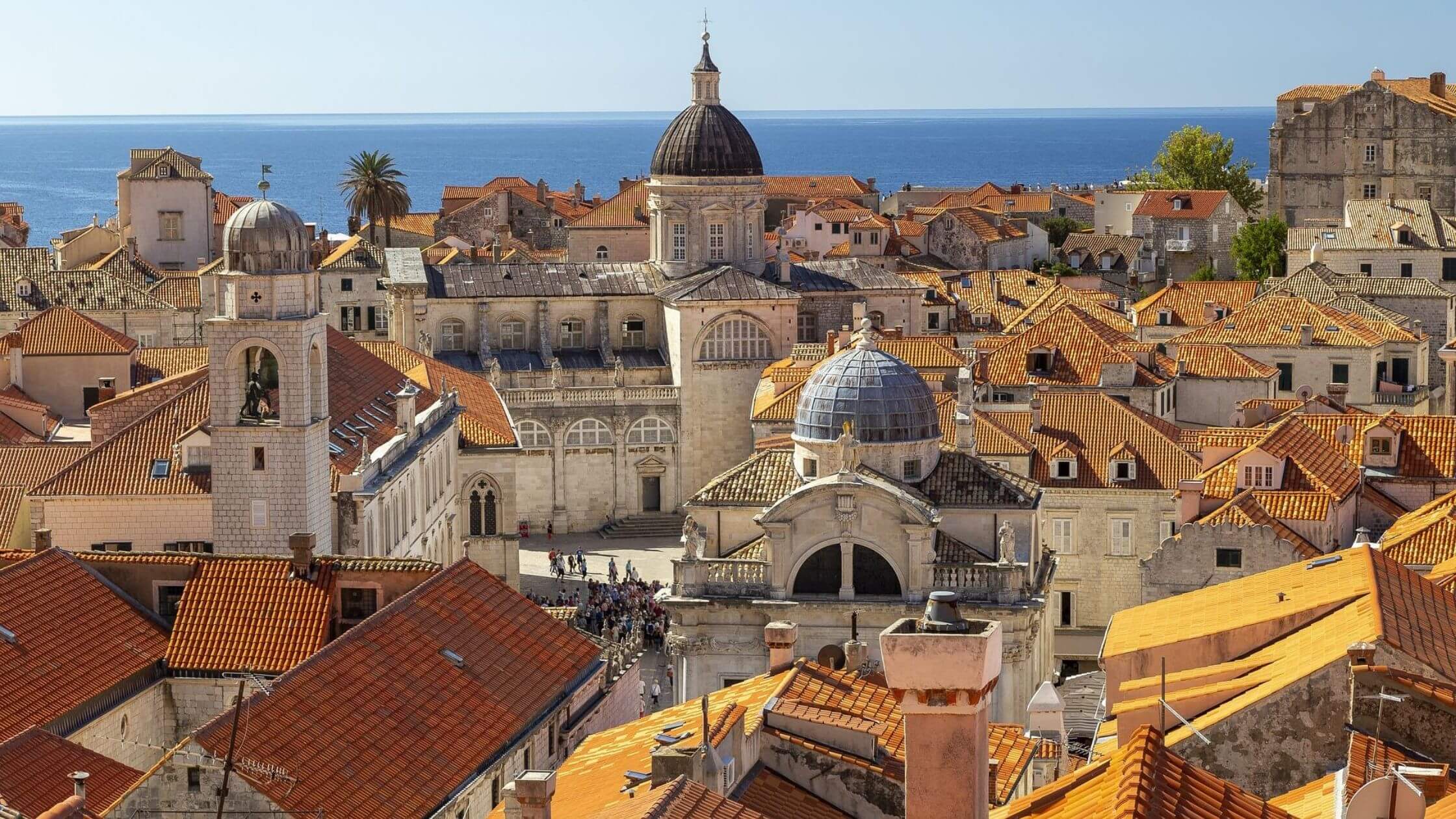
Both talk about how they enjoy the logic and rationale behind coding and programming. (Image: Pexels)
There are also a lot of people who have an engineering degree, but then they end up working outside the industry, why do you think that's the case?
I: Well, to be honest, some people just want a degree. It's not important for them what the degree is, they just want it for now and maybe one day in the future decide if they will work in the field. A lot of my friends (who graduated) were asking if this was the right decision. But their problem is they don't want to try (to get a job in the industry).
And if you try for one year or two years, however long, you have time to figure out if this is for you or not. I think that there are a lot of companies that are giving students these opportunities, but (students) are not taking them. I don’t know why.
Right. And what about you N, when you graduated? Do you find all your friends working in the field?
N: I think some are in teaching and some are still without jobs because they don't have the right skills. So, I think they are trying to create some projects to put on their CV. Basically before (this job), I applied to different companies and I was worried about my 5 years spent (in college) and if I even knew anything, so this was what scared me (regarding jobs and the industry).
I see, also do you see yourself staying in this field?
N: Sometimes I feel that this is for me, sometimes I feel it isn't. But more so I see myself staying. I think it will get better with more interesting work, but I feel I'm better here (in the software industry) generally.
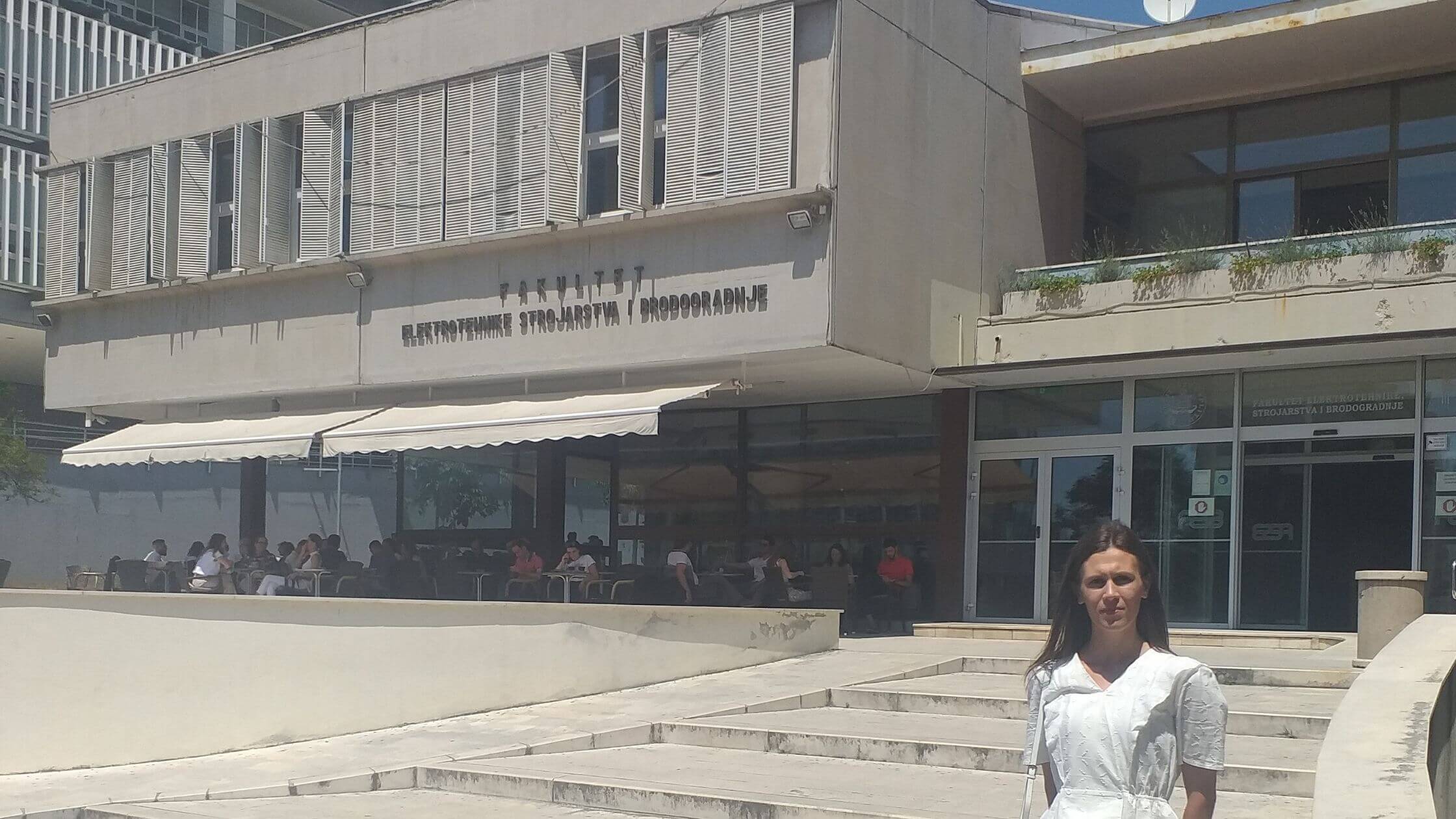
Nikolina standing outside the faculty building after successfully defending her Master's thesis. (Image: Nikolina Zelic/Personal album)
Yeah. And for you (I), do you feel as a woman in engineering any different?
I: No, I think everything is the same.
Great, so you see yourself exploring this more?
I: Yes, for now. I am really happy here. I don't know, maybe I’m different. Because at first it was difficult but my colleague, he also helps a lot. A lot! When I have some problem with anything, I can ask him.
He also really encouraged me to try after doing the hackathon here (in December 2021). If I didn't hear from someone who is working in this field for a few years, I don't know, would probably say, I'm not sure (about staying in the field). But he really encouraged me to try and said that I will learn something.
Right, that’s really cool that you have supportive colleagues. I have another question about school, did you have a lot of female engineers in your courses?
I: Yeah, but when I was in the first year, they told us that five years ago, there were almost no women in the faculty.
What do you think is the split now?
Both: 50-50? Yeah, 50-50.
Wow, ok.
I: Well, I think it's more women than men, actually. Now at least, but we can say 50-50.
N: Yeah. Maybe for telecommunications, I think there are more women.
Great, before we close, I have a final question, with the latest census results, have either of you thought of leaving Croatia? For better jobs or salaries?
N: Well, I love Canada so much.
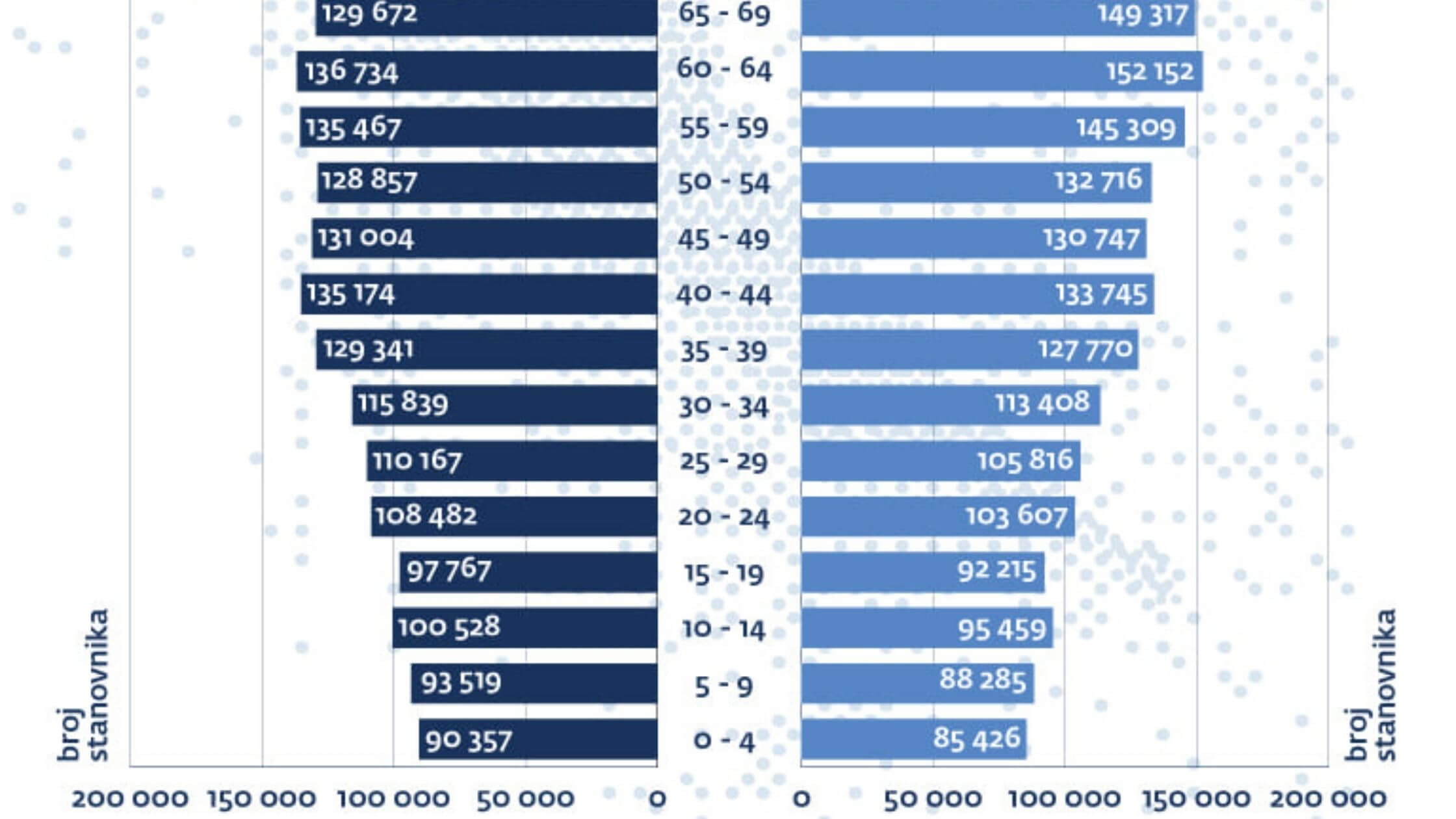
Croatia has seen a population decline of almost 10% over the last decade, with the younger generation leaving to seek better opportunities overseas. (Image: DZS/Facebook screenshot)
Have you been before?
N: No, no, no. But I just love that country. I don't know why.
Okay. Maybe something you in the media.
N: Yes, it seems much better and nicer, but it depends on the province? I just want to try, to see how it's like working in another country, in any country. It can be in Germany, if not somewhere.
For you, Ivana, you seemed more hesitant to the idea?
I: Yeah, working and living here. Definitely, I can say I would like to (continue). My friends and family are here and when I step out of the house, there’s the sea right at my door. Well, I live in Kaštela, it’s a little bit different than Split right, it's more casual but yeah, I really like it.
Cool, well thank you ladies for this chat, I feel I know more about the STEM industry and the Croatian education system in general!
For more, check our lifestyle section.
Croatian Conversation: I Have a Feeling That I Am Doing Something Worthy
10 March 2022 - Oftentimes as travelers or visitors, when we think of Croatia, we are quick to envision sparkling seas, cobbled streets, and gastronomic wonders. But we often overlook one important aspect of this young nation - its people.
In this series, I have the privilege of sharing the local culture through individuals from all walks of life. These are some of the everyday people you may simply pass by while walking down the street. But through these coffee house conversations, I reveal the spark of extraordinariness that lies within.
Today, I’d like Total Croatia News readers to meet Split native – Tomislav Primorac (Tomo), who has generously offered (more like coerced) to kick off this session.
Tomo is a data scientist, who is equally comfortable with artificial intelligence, datasets, and equations, as he is with entertaining people. The first time we crossed paths, it was over peka in the middle of a horse ranch. Despite the language barrier, two things were clear - he knew how to work a crowd, and he was really funny in Croatian.
As it turned out, Tomo had a different side that only came out in the evenings. No, he’s not a vampire but perhaps, equally as mythical, part of Split’s underground but growing stand-up comedy scene. Comedy is such as integral part of our interactions that is woven into the fabric of our everday existance. The best comedians, on the other hand, can be considered the most effective cultural anthropologists and critical thinkers as they explore ideas and subvert norms through the medium of humour.
Read on as we discuss all things from George Carlin to aliens and crabs, his grandmothers as his muses, the importance of creative passions, persistence, and commitment.
So, one of the first things I have to ask is - how does a data scientist get into stand-up comedy?
Yeah, there's two things. First, there was no stand-up comedy in Split when I started. I mean, there was hardly any stand-up in all of Croatia. There were some people in Zagreb that did it, but it felt more frowned upon than celebrated in Croatia. But as soon as it came to be, people reacted really well. It’s more authentic, you know, when it comes from people from your town, you can relate to it more.
So, I saw that there was an open mic in Zagreb, it was actually better for me to try stand-up in front of people who don't even know who I am, in a town where I don't live, then if I fail, nobody knows about it! Fortunately, it was all right, so I continued. This was eight years ago.
But a few years before our (his comedic group) first gig, we were already writing material independently. You have to have this enthusiasm of hoping to do it and even if you're never going to do it, the whole process of creation is rewarding enough. It's not like we saw an open mic and said, right, maybe we should try this.
Right, so who are some of the people that inspire your comedy?
First idols, of course, were from England and America where there’s a scene. I think you identify stand-up probably more with America. I think one of the first people that all young comedians idolize is George Carlin, because when you're in high school, he's a rock star, a thinker, and a philosopher. So, he's the first one, for sure.
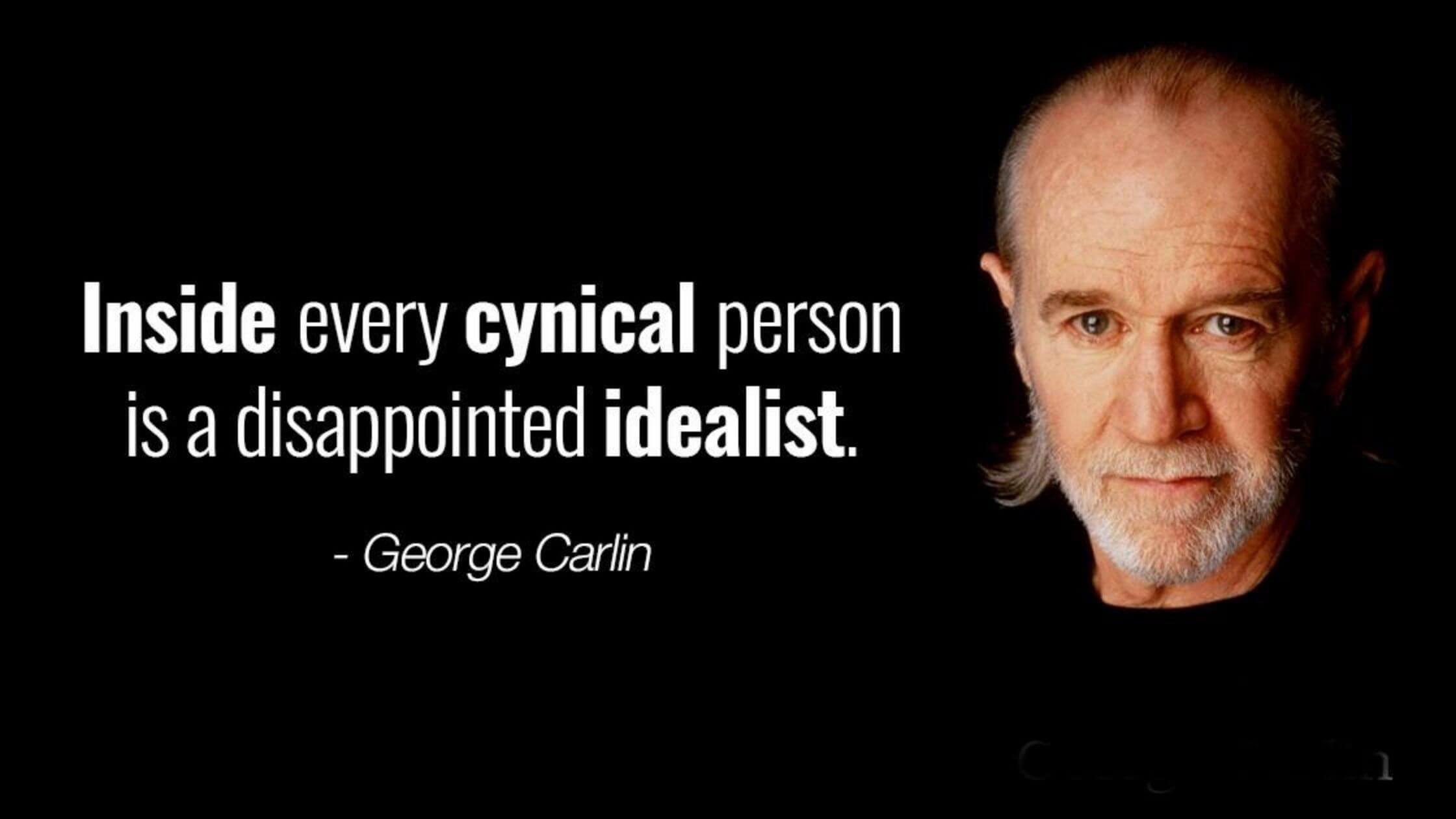
Image: George Carlin/Facebook
As soon as I started doing it, I realized that I can't do what he does. I'm a beginner, you have to work up to that to get people to respect that you can discuss interesting and serious topics.
You say you actually have to work up to it, how do you mean?
Yeah, you must get the people's vote, gain credibility. I look at it through two different perspectives. One perspective is technical, you have to get good at making people laugh, talking in front of them and making them listen.
The other thing is, why should they listen to you say something interesting? Who are you? So, you have to develop the confidence and make them believe that you have something interesting to say, and then you actually have to say it!
Right, because the impression of stand-up is you jump on stage and you just ad-lib everything. There’s actually a whole process behind it.
Yes. Your name and your stage persona and stuff like that is a long-term process. In the short term, if you look at one show, you do an hour or so, you can’t just jump to the serious topics.
I mean, I would have to add that in Croatia, I think that the whole stand-up scene and audience is not yet there for us to have a George Carlin you know? People are still just interested in laughing and having a good time.
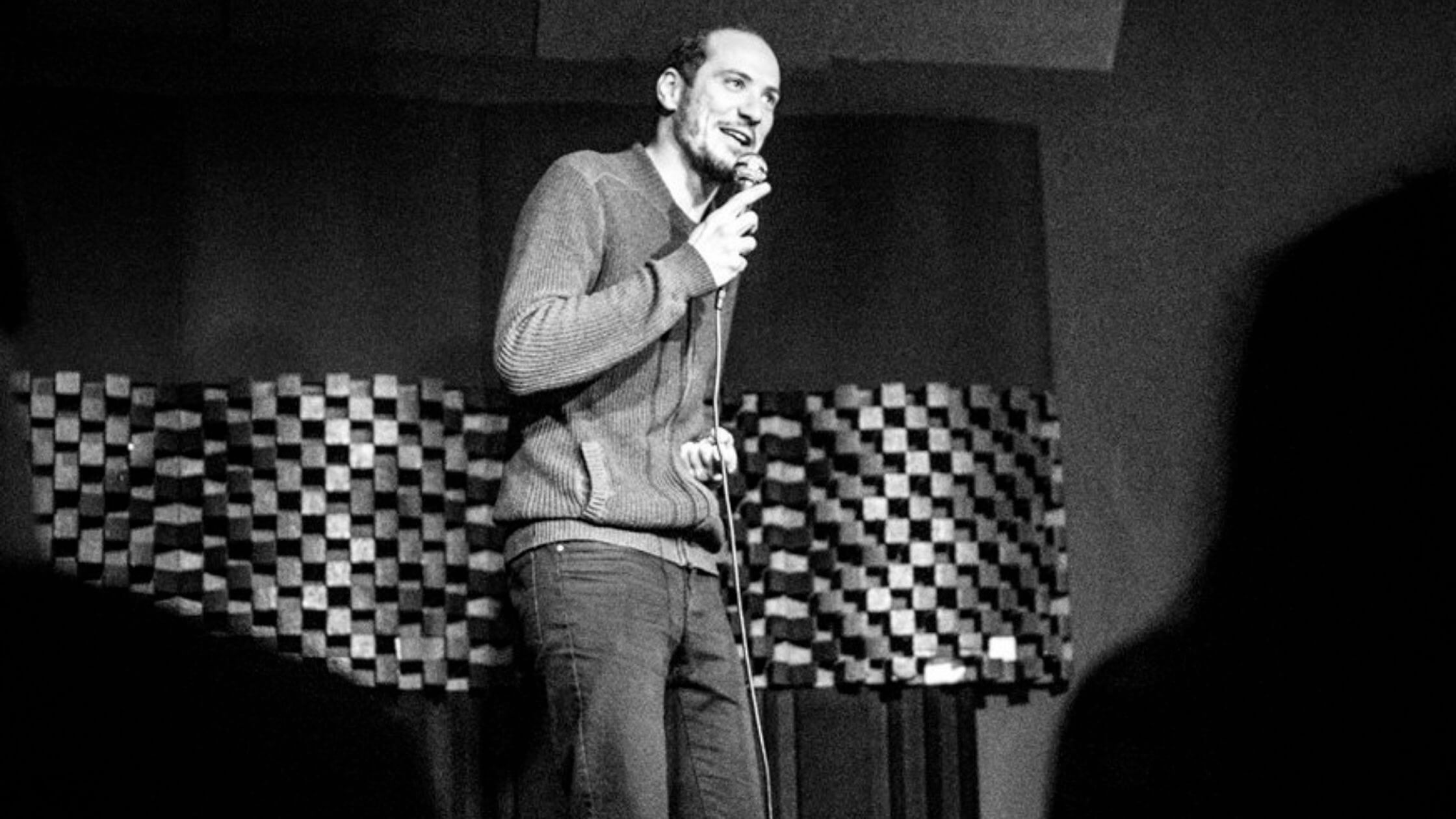
Tomo in his element. Image: Nikola Radovani/Tomislav Primorac Facebook
But why then did you keep this a secret from your own family?
Only when enough local people from Split did it, then I said, okay, now this is not weird anymore because it didn't even exist as a profession!
When I first traveled from Split to Zagreb to do these shows, it meant everything to me. I'm jealous of my former self because I don't have this enthusiasm anymore. When I first started it was like, “Oh, my God, I can't wait to do the show three months from now!”
And if anyone had known this, they’d probably say, “What are you doing? This is stupid!” Because people here, especially in Split, they have this “crabs in the barrel” mentality, which is the thing that I criticize about Split the most.
Is it similar to this saying “frog in a well”, where someone only sees that tiny sky and thinks it's their world?
Related but it's when one of the crabs tries to climb out, the others pull it back in! In Zagreb, when you start trying to do something new, it's fun because it's a large city. You try to do something different in Split, people are not so open. I think this mentality is changing but when I first started, Split was still closed-minded.
It’s amazing that it was so difficult, but you still managed to find a team of people.
Yeah. At first, it was just me, and then there were two of us. Okay, so this is an important thing, it’s all thanks to a workshop by Marina Orsag, one of the most famous comedians in Croatia. She organized this open mic in Zagreb and when she saw me performing, she said, “Okay, so there's somebody from Split. Maybe we should do this in Split to see who catches on”, and that's how all the others came on board. There were a lot of us throughout the years, but only the four of us really stayed together. We’re persistent and committed to the whole.
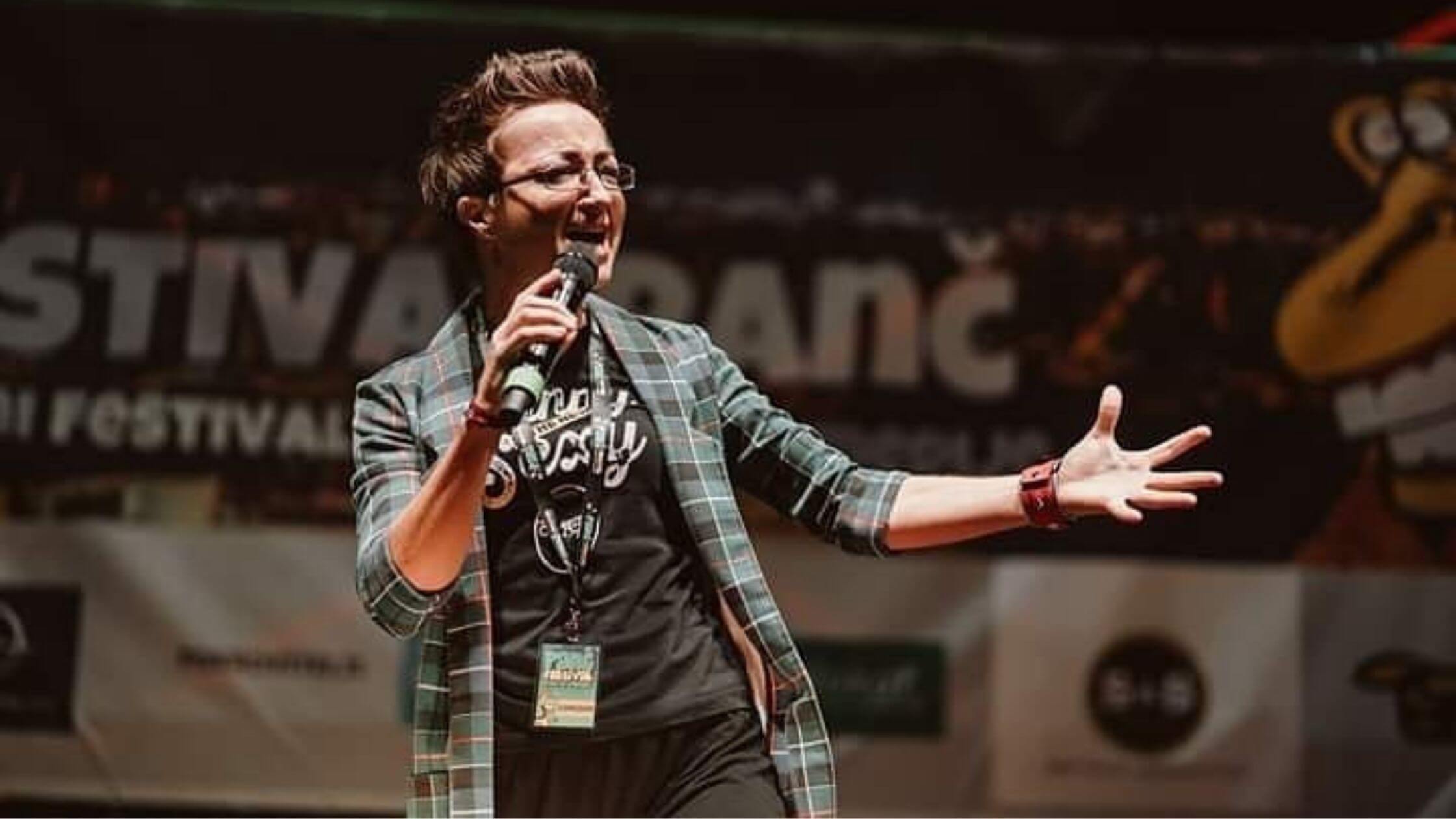
Image: Famous Croatian Comidianne, Marina Orsag. Marina Orsag/Facebook
It's a huge blessing because like, the four of us, to me, because we have events, we are together all the time, we're great friends, get along really well and complement each other. We’ve had huge challenges which we overcame, sharing a unique path in life and career. And that's what brings us together the most.
Only my fellow comedian colleague from Split understand the things I'm going through, psychologically, to understand when I say, it's not easy to do stand-up. You don't have a private life; people go out during weekends and evenings and I have to go to do my job. Then your job becomes your personal life. So that's why we have this deeper connection, because we really share the same but rare experiences
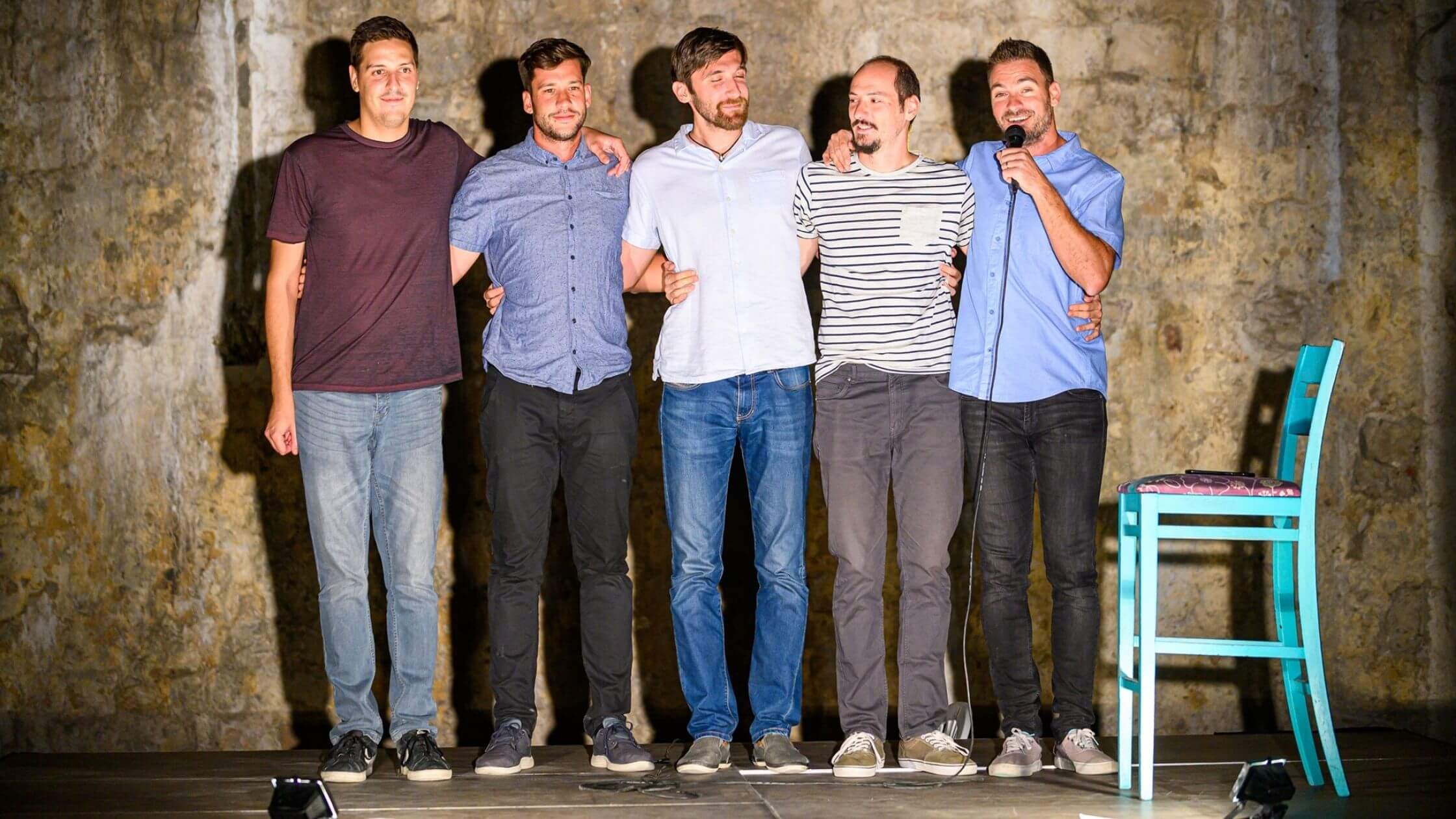
The crew after a show in Trogir's historical center. Image: Dino Čaljkušić/Visit Trogir Facebook
It’s sort of inspirational to others in a way, that you’ve managed to overcome these setbacks.
I hope we are. A lot of other comedians from different scenes in Dalmatia also started to come up after seeing us. For example, the other day, someone contacted us and asked, “I see you organize your own open mics, can I come?” So, by growing ourselves, we’re also opening new doors for other people. It’s a great process to be a part of.
Do you have any routines that you go through before you get on stage? How do you prepare for a show?
It depends on what type of show it is, you know, some shows I’ve already done 50 times, so I don't even have to rehearse. Some of them I'm so nervous that I have to look at my notes all the time. I get my notes and then I wait outside the bar or in the car, whatever, I'm going through my material and memorizing and sometimes even adding new things.
But, you know, this is just the technical part - remembering and committing to memory the setting, writing, but the other part is to get the right energy.
How do you decide if you’re going to be more energetic or…
It is tricky, because you have to go from being a comedian to a host, and it depends a lot on the audience. Sometimes you just get on stage, and they start clapping. Okay, so you're ready. You don't even have to do anything. And sometimes you just go and then you go, oh come on. Come on. Can I hear you?
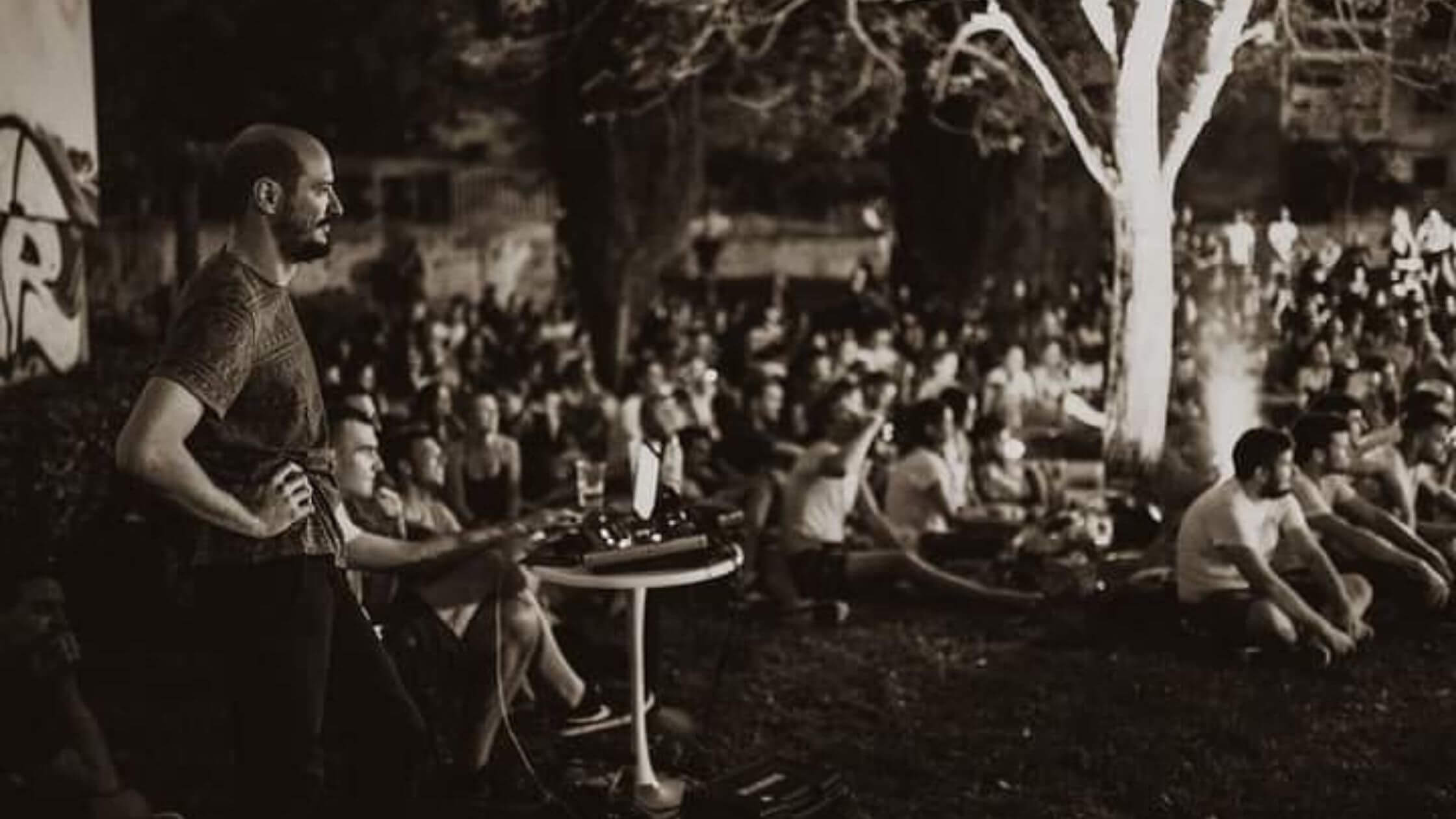
Warming up on the sidelines. Image: Frane Balta/Tomislav Primorac Facebook
So, if you're just sitting before you have to go on stage, you're probably just going to be too mellow. So, for me, it helps to drink a little bit before.
Nice, what’s your drink of choice?
Probably beer. It's probably not a great long-term plan for my liver.
Yeah, it kind of breaks down your own personal barriers, makes you a little more comfortable and you're not overthinking
Yes, yes. Yeah. That's exactly it!
Right, so what kind of comedy or routines do tend to drift towards?
A lot of my observational humor is actually similar to Jerry Seinfeld, how people behave, how they interact. What I also get from George Carlin is the analysis of language, a reflection of how people communicate to each other.
A lot of times we don't know how weird our actions are…
Yeah, I mean, if you want to be an observational comedian and notice things about the world, sometimes you have to be like an alien, you know? Watch how people behave, how they communicate and gestures. These are the things that you notice, if you have the ability to alienate yourself.
I notice you also like joking about your family members
That's another interesting thing that I noticed, the communication gap between generations. So, my interaction with my nephew as a kid, gives you a look at how different we are, and what humor can be drawn from this difference in age.
So, I really like to talk about me versus my mother, and me versus my grandmother, and when you have this generational gap, you can extract a lot of humor out of it. These are normal human interactions, but I find a lot of inspiration in this.
Give me an example
I like to use my grandmother because she's always really excited to see me. You know, sometimes I visit just to feel the excitement of somebody seeing me, because your grandmother really just loves you.
The best example of how much she loves is that she thinks I'm beautiful. “Look at him how pretty he is”. As if I was an actor, you know?

Tomo and his muses. Image: Tomislav Primorac/Facebook
Like Brad Pitt?
Probably more like someone from a documentary.
Do you have any plans to do a show in English?
We tried to do this maybe four years ago. And then I decided not to continue because there's a lot of challenges in performing in English and in performing for other audience, because humor is so contextualized
Yes, it is.
And a lot of it that you think it's not contextualized, really is. For example, I can speak about my mother in Croatia, and they will get it in Serbia, Bosnia and Herzegovina, Montenegro, and Slovenia. But if I try to talk about my mother in front of a global audience, they don't have the same mother as we do here!
Also, a lot of humor is also about language which doesn't really work in English. And then there's the biggest challenge if I don't have a good flow.
Right, if you're not confident it's going to show that people will really pick up
Yeah, I would really have to practice.
Ok before letting you go, what is one of your favorite or most memorable shows you've ever done and why?
Probably the first time I did my one-man show, four years ago, because after four or five years of doing stand-ups, I finally managed to gather enough material and courage to do my own thing.
And people were really, REALLY supportive. A lot of friends in the audience and I got a lot of love from them. And that is the first time I really felt like, this is really good, I get to perform, and I get to be in front of people who appreciate it.
That was really one of the most beautiful feelings ever, you know, if you're just doing a show, and you have a feeling that you’re something that's valuable, right?
Indeed, Tomo, well said.
If you want to get to know Tomo more and his upcoming shows, check out his page.
For more, check out our lifestyle section.


